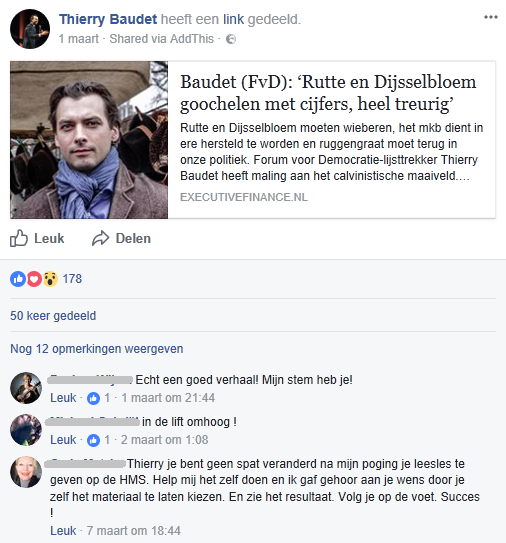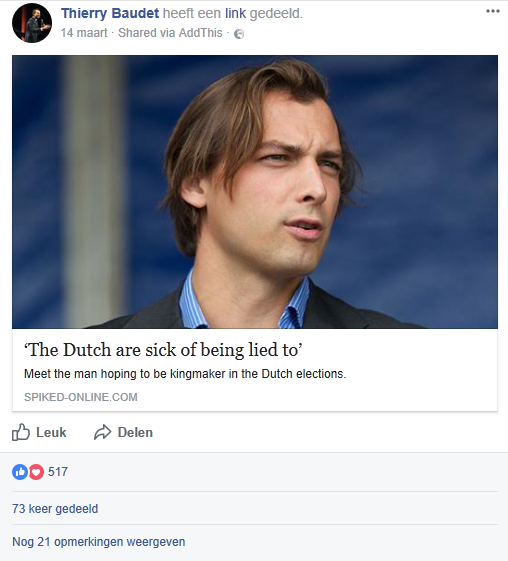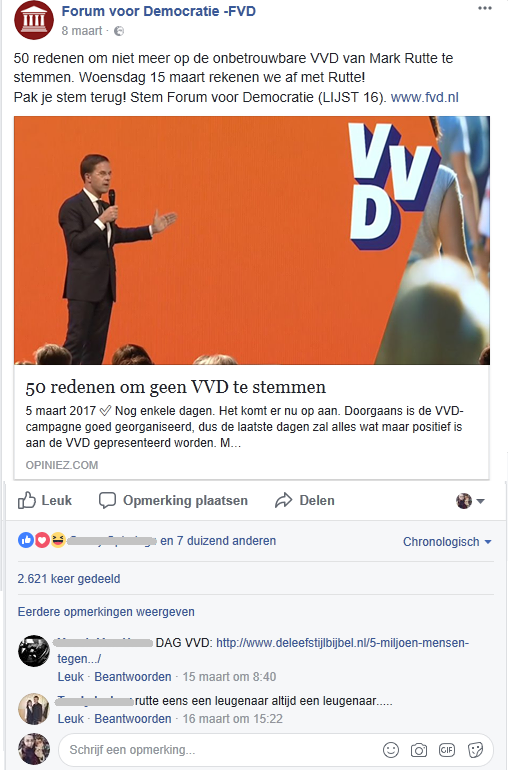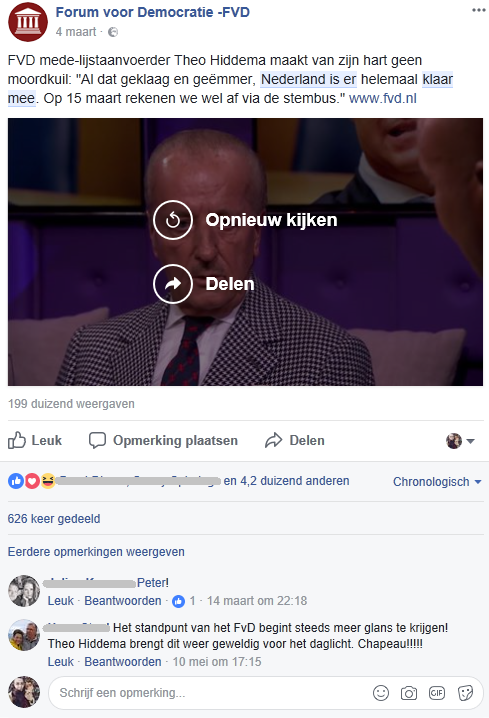
How Forum voor Democratie puts itself in the spotlights
On FvD's use of Facebook to construct their message
The (political) impact of media, and in particular social media, can no longer be denied in our lives. This article will show how the Dutch political party Forum voor Democratie has put itself in the spotlights by constructing their message on Facebook.
We come into contact with media on a daily basis, with one of the most influential types of media nowadays being social media, such as Facebook, Twitter, Instagram and YouTube. Each platform has its own features and benefits. Political organizations use social media to achieve their goals, as does Forum voor Democratie..
Since the Dutch elections of March 2017, this new political party has been part of the House of Representatives. This is remarkable, considering that they've only been a political party since 2016. What does their social media performance have to do with this dramatic growth in popularity?
This article shows how Forum voor Democratie has made use of Facebook to construct their message and therefore to put itself in the spotlights.
Message, format and new media
The media and their developments are not standing still. What was called new media a decade ago, is seen as self-evident nowadays (Thompson, 2005). New media today are internet-based. The rise of the internet and other digital technologies reinforces the meaning of new forms of visibility, and at the same time makes them more complex (Thompson, 2005). The management of visibility on the internet is a twenty-four seven job. In this new world of management of visibility, making actions visible is an important tool for shaping your message in political campaigns.
It is important to know that the meaning of message in the context of this article goes beyond ‘content’. In politics, message is more than just the themes a candidate is literally communicating. Message is about “the politician’s publicly imaginable ‘character’ presented to an electorate, with a biography and a moral profile crafted out of issues rendered of interest in the public sphere” (Lempert & Silverstein, 2012). Style and image are a comprehensive part of the politician's message.
A message has to be sold to an audience, just like a brand. That is why politicians (and their managers and campaign teams) are building their ‘brand’ by managing their visibility in mainstream and social media. The goal is to construct a positive message that creates a strong ‘brand’ with which people can identify, because they feel their own their own needs and feelings are reconized Brand, or message, is constructed in interaction with different parties within society (Maly, 2016). In this interaction, the party or the politician has to maintain a discourse and build a moral biography that is 'on message', e.g. that produces an image of a candidate who can be trusted. Potential voters need to be convinced that the candidate can do good for them. The report is always constructed in a specific time and space, where it makes sense to some, but also excludes others (Maly, 2016).
Due to the decline of old ideological politics, a lot of insecurity can be perceived in society as to how the massive and complex problems of today’s world need to be dealt with (Thompson, 2005). As a result, the character and the trustworthiness of the candidate become more and more important. The way a politician behaves in his or her daily life, is seen as a reflection of their integrity. For that reason, we have to investigate how message, in the political meaning of the word, is reconstructed, mediated and organized by those who use it (Blommaert, 2005). In order to do this, we need to have a look at the social medium that is central to this paper first: Facebook.
Facebook's algorithms
Facebook does not use a chronological timeline. Instead, what you see in your news feed is determined by an algorithm that sorts things based on what Facebook thinks you want to see. If a user likes and follows a page, Facebook starts to include the posts that page makes on their news feed. However, this is not a rule that is set in stone. In the last years, we've seen that Facebook suppresses news from pages (if they don't promote their posts) and individual posts. The result is the same, what you see on your personal news feed is edited by Facebook's algorithms.
The personalization algorithms of Facebook create a filter bubble. This already becomes obvious when considering that liking one page results in Facebook suggesting similar pages, which can also be liked and followed. Algorithms will only process and present data which is relevant for you, and because of this you only see want you want to see, which will likely be those things that fit into your ideological view of the world (Eli, 2011).
One of Facebook's newer features is the ability to not only like a post, but actually share your emotions with just one click. By doing so, Facebook has more nuanced information on your feelings and preferences and can thus create a more 'personalized' environment (and sell your data to advertisers that can use it to target you better). Besides like, you can now also laugh, love, be amazed, be angry or be sad and that is something politicians can respond to. Therefore, can make sense to post provocative messages, photos or videos. When someone is angered by the post, or indicates feeling another type of emotion by clicking on one of the available options, this is included in the algorithm, which contributes to pushing the message to virality. As a result, the post is further distributed and more people are reached. This shows how the algorithmic nature of platforms like this can become a political fact. One politician who has made keen use of this is Thierry Baudet, from Forum voor Democratie.
Thierry Baudet as vox populi
Thierry Baudets’ personal Facebook account has 15.626 followers. He doesn't allow people to see how many friends he has on his personal Facebook account, but judging from all the likes and shares, he has a substantial amount of 'friends'. During the first two weeks of March, the period before the Dutch elections, he published 11 Facebook posts in total. To get a brief insight into how he shows his message on Facebook, the most striking post and the most popular post will be analyzed.

The post as shown in figure 1 stands out the most. In this post, Baudet shares a link of an article in which he is quoted in the title: Baudet (FvD): ‘Rutte and Dijsselbloem are juggling with numbers, very sad’. The post had 178 likes and 50 people shared it. That is one in every 3,5 people who saw it. This means that the content of the post affects the readers enough to do something with it. These people reproduce the voice of Baudet and as such become part of his message.
As Lempert and Silverstein (2012) state: the meaning of message goes beyond just content. Message is also about the politician’s imaginable ‘character’ presented to an electorate. By giving an interview in which he's accusing high-ranked politicians of juggling with numbers, and then sharing it on Facebook himself, Baudet shows that he is not afraid of confrontation. He positions himself as being anti-establishment: as somebody who dares to say what needs to be said to the 'elite'. The comments as seen in figure 1 state: “A really good story you got there! You’ve got my vote!” and “You’re going up!”. The relatively high amount of ‘shares’ and the positive comments show that this way to ‘sell’ the message works out in a positive way, at least for the audience he is targeting.

The most popular post that appeared on Baudet's timeline in the first two weeks of March is again a shared link (Fig. 2) to an article in which he is featured. In this case, as well as in the previous one, a quote is used for a title: ‘The Dutch are sick of being lied to’. The post had 517 likes and was shared 73 times. The fact that both posts link to a news medium that use a quote from Baudet as a title, is already an index of the sensational nature of his discourse. The quotes are used as a title, because they're considered 'clickeable'. Moreover, in both cases the quote is a good summary of his populist discourse. He accuses 'the elites' to be liars and he presents himself, implicitly, as the voice of the people.
The title of the article thus communicates the key message of Baudet: that he won't lie; that he wants to stand up for Dutch society. According to Thompson (2005), feelings of insecurity about the massive and complex problems in today’s world are rising and someone like Baudet tries to convert these feelings in electoral capital. This means that trustworthiness is more important than ever.
The image of Forum voor Democratie
Forum voor Democratie also has its own Facebook page. There are 140.012 people who like the page, and 145.310 people who actually follow the page. In the two weeks before the elections, Forum voor Democratie published over 50 Facebook posts in total. The post which stands out the most and the most popular post will be analysed in order to show how the party tried to construct its message.

The most popular post that appeared on the timeline of Forum voor Democratie, is, as was the case on Thierry Baudet's personal page, a shared link. This link leads to an article with the title: 50 reasons why you should not vote on the VVD. Accompanying this titel is the following text: '50 reasons not to vote for the unreliable VVD of Mark Rutte. Wednesday, March 15th we will finish Rutte! Get your vote back! Vote for Forum for Democracy!' The post had over 7.000 likes and was shared 2.621 times. What's striking about this post, is that the article in the link does not have a direct connection to the party. This leads to the question why Forum voor Democratie is sharing this link with its followers.
According to Maly (2016), a message has to be sold like a brand. Placing yourself as the opposite of the biggest competitor, is also a way of selling a brand. Politicians and their management are creative in searching for ways to build their message into social media (Maly, 2016). This usually happens by distributing positive messages about themselves and negative messaging about their opponents. The opinion piece that was shared in this post is an example of such negative messaging about the biggest mainstream competitor of Forum voor Democratie. What gives it extra authority is that it is not written by the party itself or one of its politicians, but by a seemingly objective writer.
The success of the article triggers Facebook's algorithm. We see that many people not only share the article; they also show approval in the comments. Take for example the comments as shown in figure 3. They say: “BYE VVD” and “Rutte, once a liar, always a liar”. The reactions co-construct the message that the VVD and especially Rutte are liars. By posting these comments, they push the message outside the filter bubble and potentially, they will receive recommendations to like sites that advocate similar points of view (Eli, 2011). The result of these shares and likes will also be that more Forum voor Democratie posts will be visible in someone’s timeline. Another consequence is that Facebook friends can see what the Facebook member has liked. In this way, the range of people the post can reach is greatly increased.

In the post in figure 4, Forum voor Democratie posted a short video, which features Theo Hiddema as a guest at the Dutch talk show RTL late night. In the video, the host asks the question: What would be the limit of freedom of speech? Hiddema speaks up for the people and says that everyone is fed up with getting a lawsuit for every small “racism problem”. He says that these actions ruin the debate and that it's precisely these actions that create a separation in society. As stated in the accompanying text: FVD co-leader Theo Hiddema speaks out frankly: “All that nagging and complaining, the Netherlands are all done with it. On March 15th, we’ll end it via the ballot box”.
As Lempert and Silverstein (2012) state: message is not only about the actual message, but also about how the politician’s publicly imaginable ‘character’ is presented to an electorate. This also contains a biography and a moral profile, crafted out of issues rendered of interests in the public sphere. Sharing a video is a very smart way to show a politician’s character. In the video, Hiddema is clearly frustrated about the way things go. Unless you are a great actor, that is not something you can fake. Hiddema clearly positions himself at the radical and even far right side of the political spectrum: racism isn't the problem, in his opinion, but the people who take action against it.
Hiddema is not only providing clear arguments, explicitly positioning the party at the radical right side of the spectrum; he also communicates his identity. As Thompson (2005) states: society feels insecure about how the massive and complex problems in today’s world need to be tackled. Not only the politician's character, but also their trustworthiness have never before been as important. Hiddema is a lawyer, and it is clear that he has extensive knowledge of the law. By appearing on national television in such a way, Hiddema shows that he and his party can be trusted, that they know what they are doing and that they are willing to do what's best for society. Hiddema and Baudet aim at convincing those voters who are at the far right side of the VVD electorate and the people who vote for Geert Wilders' PVV, but now want a 'decent alternative'.
How Forum voor Democratie puts itself in the spotlights
As Baudet once said in an interview with the Dutch paper Volkskrant (2017): “The established parties mainly campaign through the traditional media. We quickly noticed: f***, we will never intervene! That is why we started to specialize in conducting an online campaign. It was a virtue of necessity.” And so they did. If we look at the amount of posts that have been uploaded, it is clear that the campaign was mainly conducted from the official Forum voor Democratie account. In the posts, different ways have been used to get the message across to the public: from standing up for the people and naming what they want to do better, to positioning themselves against the competition and showing that their way of tackling the issues at hand is the wrong way.
The way Forum voor Democratie have constructed their message is solid. With their stubborn and provocative way of doing things, they know how to reach a broad audience. They show courage and therefore win the trust of the public. Their targeted and sometimes provocative statements fit into the format of commercial mass media and are picked up by the algorithms of social media. As the fastest growing political party on Facebook, they clearly know how algorithms work and they are not afraid to use them as a strategy.
References
Blommaert, J. (2005). Ideology. Discourse. A Critical Introduction. New York: Cambridge University Press, 158-202
Lempert, M. and Silverstein, M. (2012). Creatures of politics. Media, message and the American presidency. Bloomington and Indianapolis: Indiana University Press.
Mali, I (2016). Why Trump won. Retrieved on 16 november 2017
Mebius, D (2017), Thierry Baudet: 'Ik ben erg door Fortuyn geïnspireerd, maar kan niet in zijn schaduw staan. Retrieved on 8 december 2017
Pariser, Eli. The Filter Bubble: What the Internet Is Hiding from You. New York: Penguin Press.
Thompson, J, B. (2005). The new visibility. Theory, culture & society. 22 (6), 31-51. doi: 10.1177/0263276405059413